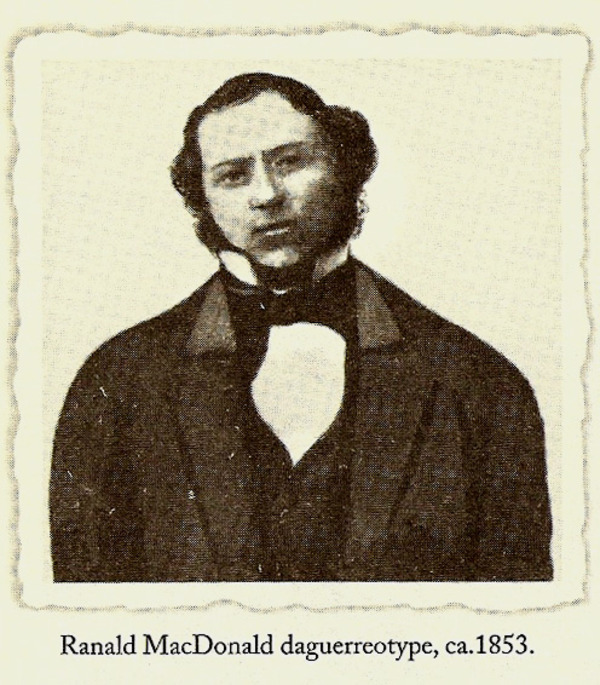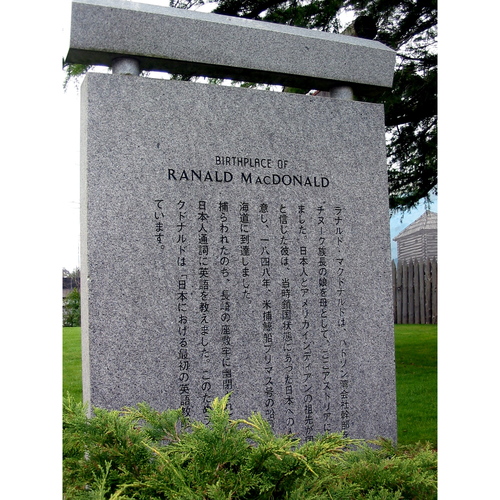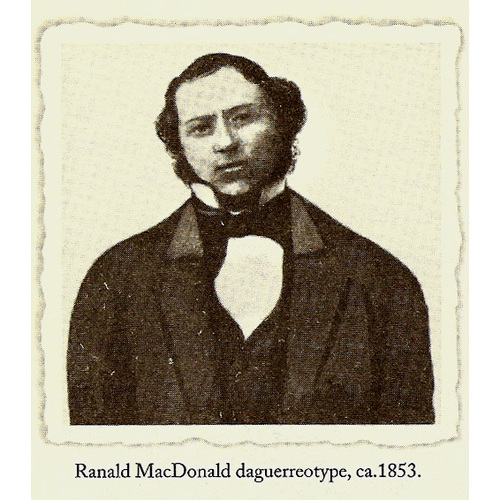
Source: Link
MACDONALD, RANALD, adventurer, teacher, explorer, businessman, and author; b. 3 Feb. 1824 in Fort George (Astoria, Oreg.), eldest son of Archibald McDonald*, an HBC fur trader, and Chinook Indian princess Raven (Sunday), daughter of Chief Comcomly; d. unmarried 24 Aug. 1894 in Toroda, Wash.
Ranald Macdonald’s mother died shortly after his birth, and he was raised by his stepmother, Jane Klyne. After spending his early years at several Hudson’s Bay Company posts in the Columbia district, he was sent in 1834 to the Red River Academy at Fort Garry (Winnipeg) [see David Thomas Jones*]. Four years later he went to St Thomas, Upper Canada, to train in banking at a bank managed by one of his father’s friends, Edward Ermatinger*. He soon tired of this work, however, and early in 1841 he left surreptitiously to go to sea. Determined to visit the closed country of Japan, he shipped from Lahaina (Hawaii) in 1848 on the whaler Plymouth and arranged to be dropped off, appearing to be a shipwrecked sailor, near the west coast of Ezo (Hokkaido).
Taken by the Japanese authorities to Nagasaki, he made the best of his comfortable confinement in a temple room by becoming the first teacher of English in Japan, and it is as a teacher that he is best remembered there. One of his students, Enosuke Moriyama, later became a noted interpreter to the missions of Commodore Matthew Calbraith Perry in 1853–54 and of Lord Elgin [Bruce*] in 1858–59.
At the end of April 1849 Macdonald was released to the American sloop of war Preble, which was visiting Nagasaki to pick up American sailors who had deserted from the whaler Lagoda. He travelled widely in Asia, Australia, and Europe before returning, shortly after his father’s death in 1853, to his family, then living in St Andrews (Saint-André-Est), Lower Canada. He remained there for about five years, during which time he became a freemason.
In 1858 Ranald and his half-brother Allan returned to the Pacific coast, to the new colony of British Columbia. They set up a packing business between Port Douglas (Douglas), at the head of Little Harrison Lake and the Fraser River gold-mines, and ran a ferry across the Fraser at Lillooet. Their younger brother Benjamin later joined them. In 1861–62 Ranald Macdonald and Johnston George Hillbride Barnston, whose families were connected through marriage, set up the Bentinck Arm and Fraser River Road Company to service the new mines in the Cariboo district. The route for this road was a pack-trail, running from the site of present-day Bella Coola to the Fraser River near Fort Alexandria (Alexandria, B.C.). The enterprise was not completed, however, because of financial difficulties. In 1864 Macdonald and Barnston’s younger brother Alexander joined the Vancouver Island Exploring Expedition [see Robert Brown]. On this expedition, which crossed the largely unexplored interior of Vancouver Island four times, Macdonald participated in the discovery of vast stands of prime timber, the Sooke gold-fields, and a large coalfield on Browns River near Comox. The next year he led a government-sponsored expedition to explore for minerals in the Horsefly area of the Cariboo.
Macdonald spent the following decade in the Cariboo district, exploring, and at his ranch on Hat Creek. He was also an employee of Barnard’s Express and Stage Line [see Francis Jones Barnard*] and later of Bonaparte House, the hotel run by Charles Augustus Semlin* and Philip Parke at Cache Creek. In 1875 he assisted his cousin Christina MacDonald in her trading operation at Kamloops. He finally retired to a log cabin close to the home of Christina’s brother Donald near Fort Colvile (near Colville, Wash.), where his own father had developed a large farm for the HBC during the 1830s.
While in retirement, Macdonald tried to find a publisher for his account of his visit to Japan. The manuscript was edited by Malcolm McLeod, who in 1872 had published Archibald McDonald’s Peace River journal, and several drafts were submitted to Canadian, American, and British publishers. A proposal for publication in Montreal under the title “A Canadian in Japan” fell through in 1892 because of a lack of subscriptions, but a revised version which McLeod prepared the following year finally appeared in 1923.
A portion of Ranald Macdonald’s original account of his visit to Japan is preserved in Malcolm McLeod’s papers at PABC, Add. mss 1249, along with one of the three manuscript copies of McLeod’s final 1893 edition, “Japan: story of adventure of Ranald MacDonald, first teacher of English in Japan, A.D. 1848–49.” The other surviving copy (the one McLeod returned to Macdonald) is held by the Eastern Wash. State Hist. Soc. (Spokane), which published it in 1923 as Ranald MacDonald: the narrative of his early life on the Columbia under the Hudson’s Bay Company’s regime; of his experiences in the Pacific whale fishery; and of his great adventure to Japan; with a sketch of his later life on the western frontier, 1824–1894, ed. W. S. Lewis and Naojiro Murakami. A Japanese translation of the Narrative prepared by Toruo Tomita, Makudonarudo “Nihon Kaisoki”, appeared in Tokyo in 1979.
Macdonald is also the author of Bentinck Arm and Fraser River Road Company, Limited, prospectus (Victoria, 1862), prepared in collaboration with his partner, Johnston George Hillbride Barnston.
Japan, Ministry of Foreign Affairs Repository (Tokyo), Zoku Tsushin Zenran Ruishu (coil. of docs. from the time of the Tokugawa government), “Beikoku Hyomin no Geisen Nagasaki-ko ni Torai Ikken” (record of the visit to Nagasaki of the Preble, 1849) and “Kits Kaigan Hyochaku no Beikokujin Nagasaki Goso a Ikken, 1848–1849” (record of Ranald Macdonald and the Lagoda seamen). PABC, Add. mss 794, esp. Vancouver Island Exploring Expedition journals of Robert Brown and of Ranald Macdonald. [Robert Brown], Vancouver Island; exploration, 1864 (Victoria, [1865]). “An interesting visitor,” Ottawa Daily Citizen, 1 Sept. 1888; repr. in Daily News-Advertiser (Vancouver), 15 Sept. 1888. Frederick Whymper, Travel and adventure in the territory of Alaska, formerly Russian America – now ceded to the United States – and in various other parts of the north Pacific (London, 1868). British Colonist (Victoria), 1858–60, continued as Daily British Colonist, 1860–64, and Daily Colonist, September 1894. Cariboo Sentinel (Barkerville, B.C.), 12 June 1865. China Mail (Hong Kong), 1 May 1849. Morning Oregonian (Portland), 12 Feb. 1891. Spokesman-Review (Spokane), 31 Aug. 1894. DAB. J. E. Ferris, “Ranald MacDonald, the sailor boy who visited Japan,” Pacific Northwest Quarterly (Seattle, Wash.), 48 (1957): 13–16; “Ranald MacDonald’s monument, Toroda Creek, state of Washington,” BCHQ, 15 (1951): 223–27. Province (Vancouver), 18 Nov. 1963. Shunzo Sakamaki, “Japan and the United States, 1790–1853,” Asiatic Soc. of Japan, Trans., 2nd ser., 18 (1939): 44–49. Vancouver Daily Province, 20 May 1928.
Cite This Article
David H. Wallace, “MACDONALD, RANALD,” in Dictionary of Canadian Biography, vol. 12, University of Toronto/Université Laval, 2003–, accessed February 13, 2026, https://www.biographi.ca/en/bio/macdonald_ranald_12E.html.
The citation above shows the format for footnotes and endnotes according to the Chicago manual of style (16th edition). Information to be used in other citation formats:
| Permalink: | https://www.biographi.ca/en/bio/macdonald_ranald_12E.html |
| Author of Article: | David H. Wallace |
| Title of Article: | MACDONALD, RANALD |
| Publication Name: | Dictionary of Canadian Biography, vol. 12 |
| Publisher: | University of Toronto/Université Laval |
| Year of publication: | 1990 |
| Year of revision: | 1990 |
| Access Date: | February 13, 2026 |




